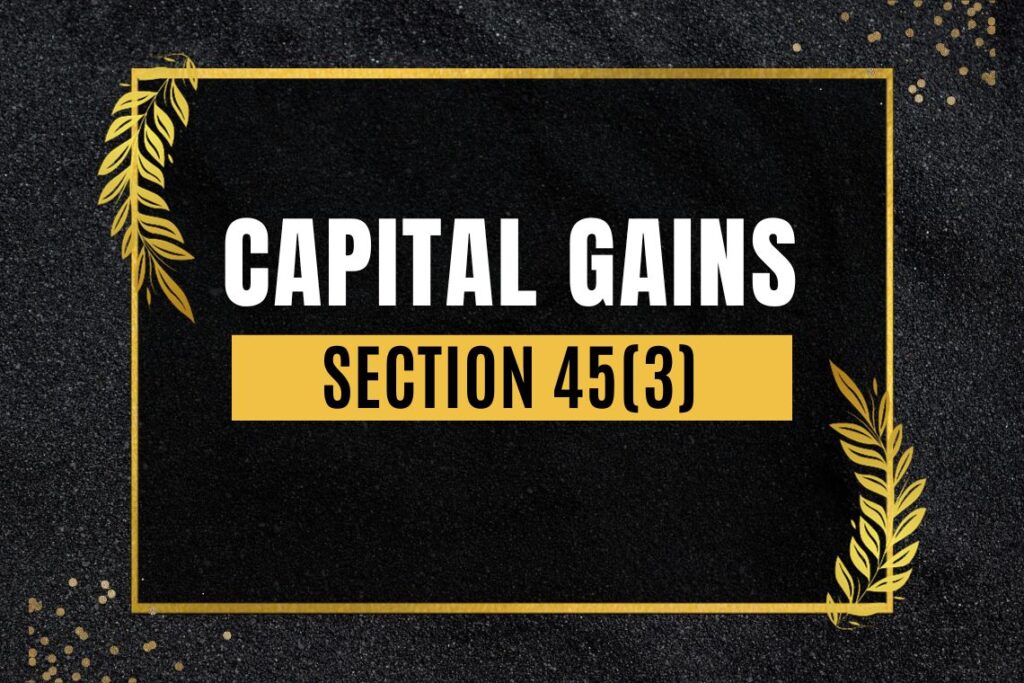Section 45(3) of the Indian Income Tax Act, 1961, deals with the taxation of capital gains arising from the transfer of a capital asset by a partner or member to a partnership firm (including an Association of Persons or Body of Individuals) as a capital contribution. Here’s an overview of this provision:
Understanding Section 45(3)
Section 45(3) of the Income Tax Act deals with the tax implications arising from the transfer of a capital asset by a partner or member to a firm, AOP, or BOI as a capital contribution. According to this section, if a partner or member transfers a capital asset to a firm, AOP, or BOI, the transfer shall be considered as a transfer made by the partner or member resulting in capital gains.
Taxation of Capital Gains
When a capital asset is transferred, the capital gains arising from such transfer are subject to taxation. The capital gains are calculated by taking the difference between the fair market value (FMV) of the asset on the date of transfer and the cost of acquisition of the asset. The capital gains are then taxed as per the applicable tax rates.
Applicability:
Section 45(3) is applicable when a partner or member transfers a capital asset (such as land, building, or securities) to a partnership firm in exchange for a share in the firm. This transfer is considered a contribution of capital to the partnership.
Tax Event:
The transfer of the capital asset to the partnership is treated as a transfer for tax purposes, even though there may not be any sale or consideration involved. This means that capital gains tax is triggered at the time of the transfer.
Computation of Capital Gains:
The capital gains are computed as the difference between the full value of the consideration received or accruing to the partner/member and the cost of acquisition of the capital asset. The cost of acquisition is usually the original cost of acquiring the asset by the partner/member.
Exemptions and Deductions:
While capital gains are generally taxable, there are certain exemptions and deductions available under the Income Tax Act. For example, if the transfer of the capital asset qualifies as a long-term capital gain, it may be eligible for a lower tax rate. Additionally, there are certain exemptions available under Section 54, 54F, and 54EC for reinvestment in specified assets like residential property or bonds.
Under Section 45(3), there is a provision that allows for a tax exemption if the following conditions are met:
- The transfer of the capital asset is to a firm (including AOP/BOI).
- The transfer is in exchange for a share or interest in the firm.
- The partner/member continues to be a partner/member in the firm after the transfer.
- The capital gains are credited to the partner/member’s capital account in the firm.
If these conditions are satisfied, the capital gains arising from the transfer may be exempt from taxation, provided certain other conditions are also met.
Reporting and Compliance:
It is important for the partner or member to report the capital gains from the transfer in their income tax return and comply with all the provisions of the Income Tax Act related to capital gains. Proper documentation and records of the transaction should also be maintained.
When a partner or member transfers a capital asset to a firm, AOP, or BOI, both the transferor and the transferee are required to comply with certain reporting and documentation requirements. The transferor needs to calculate and report the capital gains arising from the transfer in their income tax return. The transferee, on the other hand, needs to obtain a valuation report of the capital asset from a registered valuer.
Advance Tax:
Depending on the amount involved, the partner/member may be required to pay advance tax on the capital gains.
Tax Consultation:
Given the complexity of tax laws and individual circumstances, it’s advisable to consult with a qualified tax advisor or financial expert who is knowledgeable about the current tax regulations in India. They can provide guidance specific to your situation and ensure compliance with the law.
Conclusion
The transfer of a capital asset by a partner or member to a firm, AOP, or BOI as a capital contribution can have capital gains tax implications. It is important to understand the provisions of Section 45(3) of the Income Tax Act and comply with the reporting and documentation requirements. Seeking professional advice can help in ensuring proper tax planning and minimizing the tax liability arising from such transfers.











